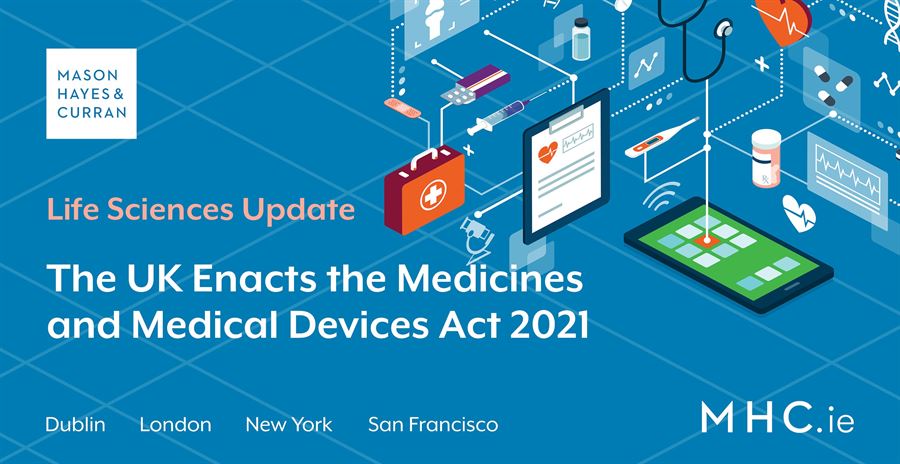
The UK recently passed the Medicines and Medical Devices Act 2021 (2021 Act) to facilitate updates to the existing regulatory framework concerning human and veterinary medicines and medical devices in the wake of Brexit.
2021 Act
The 2021 Act does four main things:
-
Introduces targeted delegated powers in the fields of human medicines, veterinary medicines and medical devices to enable the existing regulatory frameworks to be updated following the UK’s departure from the EU
-
Provides a delegated power to establish one or more information systems in relation to medical devices
-
Consolidates the enforcement provisions for medical devices and introduces sanctions, and
-
Provides an information gateway to enable the sharing of information held by the Secretary of State about medical devices, for example to warn members of the public about safety concerns
Human medicines
Part 2 of the 2021 Act deals with human medicines, and delegates power to the Secretary of State to amend or supplement laws relating to human medicines by regulation. It also specifies matters in relation to which such regulations may be made – this includes, among others, manufacturing, distribution, marketing and import authorisation; registration of pharmacy premises; labelling and packaging; prevention of supply of falsified medicines; clinical trials; and advertising.
This Part further provides for circumstances where the Secretary of State may disclose information it holds in connection with human medicines. For example, if it is required for the purpose of giving effect to an international agreement or arrangement concerning the regulation of human medicines.
Veterinary medicines
Part 3 of the 2021 Act similarly delegates power to the Secretary of State to amend or supplement the Veterinary Medicines Regulations 2013 (S.I. 2013/2033) by regulations, and provides an exhaustive list of matters the regulations can cover. This includes manufacture, marketing, supply and field trials of veterinary medicines. Part 3 also has a provision on disclosure of information similar to the one relating to human medicines.
Medical devices
Part 4 of the 2021 Act specifically deals with medical devices. This Part:
-
Delegates power to the Secretary of the State to amend or supplement the Medical Devices Regulations 2002 (UKMDR). Regulation may only be made for matters as specified. These are:
-
Manufacture, marketing and supply
-
Fees, information and offences, and
-
Disapplication of a medical devices provision in circumstances which give rise to a need to protect the public from a risk of serious harm to health
-
-
The Secretary of State has a duty to consider three factors before making such regulations:
-
The safety of medical devices;
-
The availability of medical devices; and
-
The attractiveness of the UK as a place to develop, manufacture, supply or carry out research relating to medical devices
-
-
Gives delegated powers to the Secretary of State to make regulations for a database of information on medical devices. This is to be established and managed by the Health and Social Care Information Centre. The Secretary of State may by regulations establish, and make other provisions about, a committee to advise the Secretary of State on certain regulatory matters relating to medical devices.
-
Consolidates the enforcement regime for medical devices. It confers powers on the Secretary of State to issue enforcement notices in certain circumstances. This is to achieve compliance with the medical devices regulatory framework, and to address health and safety risks posed by non-compliant devices. A breach of an enforcement notice is a criminal offence which involves fines and/or imprisonment term following a summary conviction. Where a body corporate has committed an offence, the body corporate (and, in certain circumstance, its officers) can be found liable. It is a defence that the person took all reasonable steps and exercised all due diligence to avoid commission of the offence. The Secretary of State also has the power to impose civil sanctions in relation to the criminal offences committed.
-
Empowers the Secretary of State to apply to the appropriate lower court for a forfeiture order and recover expenses incurred by its enforcement activities. The Secretary of State can also recall medical devices.
-
Provides that a breach of an obligation contained in a “medical devices provision”, which isdefined as any regulation mentioned in bullet 1 above and the UKMDR, is actionable as a breach of statutory duty. This is subject to any provision that contradicts this in a medical devices provision, and any defences that apply to a breach of statutory duty.
-
Provides an information gateway to enable the sharing of information held by the Secretary of State about medical devices. For example, to warn members of the public about safety concerns.
-
Makes it an offence to breach certain provisions of the UKMDR. The penalties for these breaches are similar to the ones mentioned above for the breach of enforcement notices.
Comments
It is hoped that the regulations made under the 2021 Act would, at least in part, seek to align the UK frameworks on human and veterinary medicines and medical devices with that in the EU.
In the meantime, the provisions of the EU Medical Devices Directive (MDD) as transposed into UK law via the UKMDR will continue to apply in Great Britain. in the EU and Northern Ireland. The EU Medical Devices Regulation (EUMDR) will replace the MDD from 26 May 2021, but the EUMDR will not be directly effective in the UK. It will be interesting to see whether the Secretary of State will make regulations under the 2021 Act to mirror the EUMDR, or at least establish a similar framework in the UK.
For more information on the implementation of the 2021 Act, contact a member of our Life Sciences or Product Regulation teams.
This article was contributed by Associate, Saadi Siddiky.
The content of this article is provided for information purposes only and does not constitute legal or other advice.
Share this:






